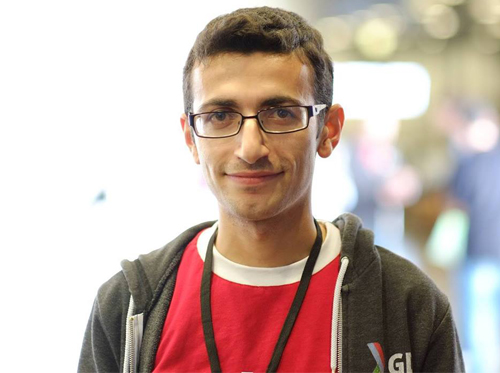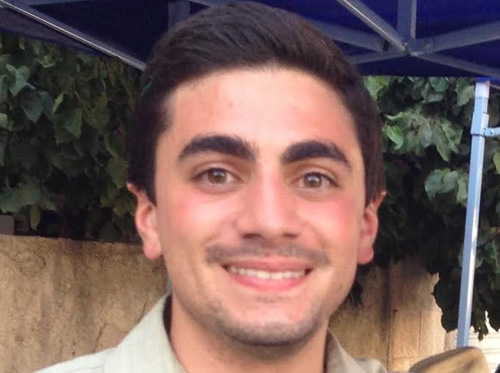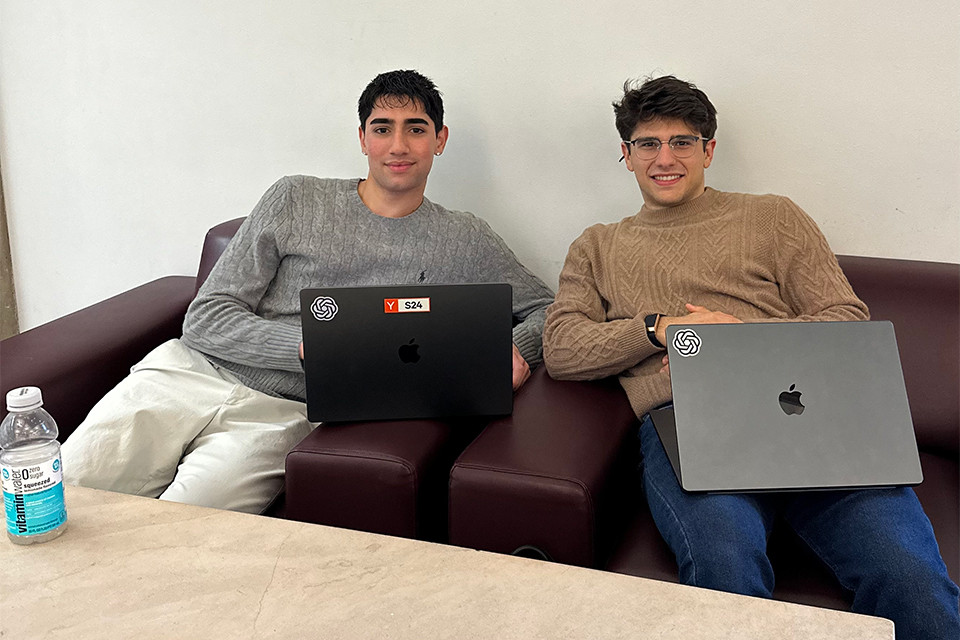-

Vardan Grigorian
10:22 | 09.12.14 | Articles | exclusive 14475
GDG Armenia: Google’s “eyes” in Armenia
On November 22-23, Google Developer Group Armenia (GDG Armenia) held the second GDG DevFest technology event in Armenia. The two-day event held at Tumo Center for Creative Technologies hosted over 200 technology lovers who were presented a number of presentations.
Itel.am interviewed GDG Armenia Coordinator Vardan Grigorian regarding DevFest’s and GDG Armenia’s activities in Armena.
- You held the second GDG DevFest last month. What made it stand out?
- Google Developer Group regularly organizes events in Armenia for programmers using Google technologies. DevFest technology event is the largest among them and it aims to bring together programmers as well as people interested in Google technologies in one place. Since Google is the sponsor of DevFest, the major part of the event focuses on Google technologies.
Taking into account the fact that many Armenian programmers are also interested in business, this year we decided to dedicate a number of presentations to successful company opportunities through the employment of Google technologies. Ways start-ups can get funding from various companies were also touched upon.
Google Employee of Armenian descent Aram Ayazyan was the special guest of this year’s event. He introduced Google Fit, which is one of the state-of-the-art Google technologies – it is used to get fitness results. The program code can be used in the personal app to get information about people’s way of life (for example, to get information from device sensors and use them in personal apps). At the event Aram Ayazyan also introduced the apps programmers can create using Google Fit.
At first we were planning to hold parallel presentations and hackathon on the second day, but in the end we decided not to organize hackathon as we realized people are way more interested in presentations. In reality, hackathon is slightly passive in Armenia and therefore we have decided to hold separate hackathon next year. It should be noted this year we had a guest from GDG Omsk who introduced two presentations.
In general, there were presentations requiring deep knowledge in technology, however, there were also such that were lighter and for example, used to introduce the interesting functions of Android’s new version.
Against last year’s 170 participants, over 200 people attended DevFest this year. There were certain issues related to funding. It should be noted that as DevFest sponsor, Google covers only part of the costs. Each GDG seeks and finds the rest of funding by local sponsors. X-TECH and Ginosi supported us this year. I hope all issues will be settled ahead of next DevFest.
By the way, a nicest thing happened at the event. Manvel Saroyan – one of the active members of GDG – took advantage of his platform and declared his love to his significant other.
- Other than DevFest, in what other activities is GDG engaged in Armenia?
-We are a bridge between programmers and Google. Whenever issues related to Google services occur, we help establish contact with the company. Certainly, the Google team working with GDG groups is quite small, but sometimes the GDG groups of other countries also help each other.
As to the members, we have never aimed to work on the number. We have around 20 active members who attend almost all our events.
Presently, there are 561 GDG groups operating in 103 countries. As GDG Armenia Group we do our best to involve regions in our activities as well. Last year we held Google Map Maker courses in four cities in Armenia – we taught them how to correctly draw their city on the map. Beyond doubt, we want to have GDG groups in other Armenian cities but we also realize that presently there are not people capable of coordinating our work in those cities. In addition, even if we find one or two people, the majority of regions lack people who have interest in such trainings.
- Why is Google not eager to open an office in Armenia? Does it mean there is really no need for that?
-We believe there is a need for Google office in Armenia as it will be greatly beneficial for particularly programmers. A market will be established and the fact that Google services are being more widely used in Armenia will also contribute to it. Besides, local Google office will resolve a number of issues related to services offered in Armenia and in the region. In particular, emerging issues will be resolved more rapidly. If we view the issue from Google’s standpoint, there is no need for office as the joint market of Armenia, Georgia and Azerbaijan is smaller than that of, say, Turkey. It’s why Google has opened an office in Turkey but hasn’t opened in our region. Google’s policy has also changed. Previously it aimed to open at least a small office in each country, while presently, it focuses more on large offices with a team of 100 programmers in each of them. It’s not possible in Armenia.
Now about the pros – if Google opened an office in Armenia, programmers leaving for abroad would stay and work in Armenia. But apparently, programmers employed at Google local office will not get the same high remuneration they would get in case of working at the company’s offices in other countries.
- Divon Lan from Google’s Next Wave Emerging Countries visited Armenia last year to find out in which sectors Google can cooperate with Armenia. A year has passed since then. Has there been any progress in this regard?
-We organized a number of interesting meetings during his visit. Divon Lan took part in an event where he got introduced to the activities of current start-ups in Armenia and had a meeting with Internet and mobile operators.
He works in a team engaged in establishing new ties with countries such as Armenia. And he believes the first step aimed at those new ties is the settlement of the language issue. It refers to the availability of Armenian language in Google products. The issue has been partially settled, although works are still underway. For example, the Armenian version of Android is already available, the rest of services are either ready or are in the last phase. Lan was concerned about this and wondered whether the language issue accounted for the passive use of Google products among Armenians.
The next step is cooperation with other organizations. It happened so we now serve as a link between him and Armenian companies and the only thing we can do is to submit their proposals to Divon Lan. Lan says we are “Google’s eyes in Armenia”. Sometimes issues related to a certain Google product emerge in Armenia. In this case, we can turn to our Armenian programmers asking to find out to what extent the issue is solvable. Whenever there is a major issue, we inform the Google team working with us about it. But it should be noted that the teams comprise people specialized in primarily programming, and therefore, they are not able to help with political and technical issues.
- In his interview with Mediamax, Divon Lan touched upon Google’s Armenian employees saying they seem to be ambassadors of Armenia to Google and always make sure that Google “flies right in case of Armenia”. Do you know how many Armenians are employed by Google?
-There are no clear data. For example, according to Aram Ayazyan, 20-30 Armenians are employed at various Google offices in various countries. I also know there is an internal group in which Armenians are united and regularly maintain contact.
- What future awaits Google technologies in Armenia?
- It depends on a certain technology. During DevFest preparation works we tend to set ourselves a task – which Google technology we will introduce. As a rule, we select those technologies of which people are not aware. Armenian programmers actively use three main Google technologies – Android, Chrome Apps Development and AngularJS. We hope to see Polymer among them in the near future as well.
It should be noted that the new companies operating in the Armenian market are comparatively open to new technologies as they continuously employ new people with technological skills. In this regard, Google technologies are more widely used by new companies.
- In general, who supports you? Is there any communication or cooperation with state bodies?
- We are not Google employees but a group of programmers using Google technologies. But we also do much in the sphere and therefore we need local support. We make no money by GDG activities and very often we have to pay out of pocket for the organization of such events.
For example, GDG Georgia was established by the Ministry of Economy. The Ministry decided to cooperate with Google and the latter suggested opening GDG. It’s quite the contrary in our case – we have set up GDG on our own and it has nothing to do with the state bodies. Not that we don’t want to cooperate with them, it’s just we don’t see any interest for their part.
Keeping up with the practice of U.S.-based GDGs we think of doing the same in Armenia, but it does not always prove to be a success. We have realized that every project should be adjusted to Armenia.
By the way, a climate of communication is gradually being set up among programmers in Armenia. They are participating in workshops and other events. Prior to that, each programmer used to stay at home or go to the office and work. Today young programmers are more open to communication.
Narine Daneghyan talked to Vardan Grigorian

17:29 | 24.09.25 | Articles
Jacopo Losso on Cross-Border Investments and Why Armenia Attracts Angels








